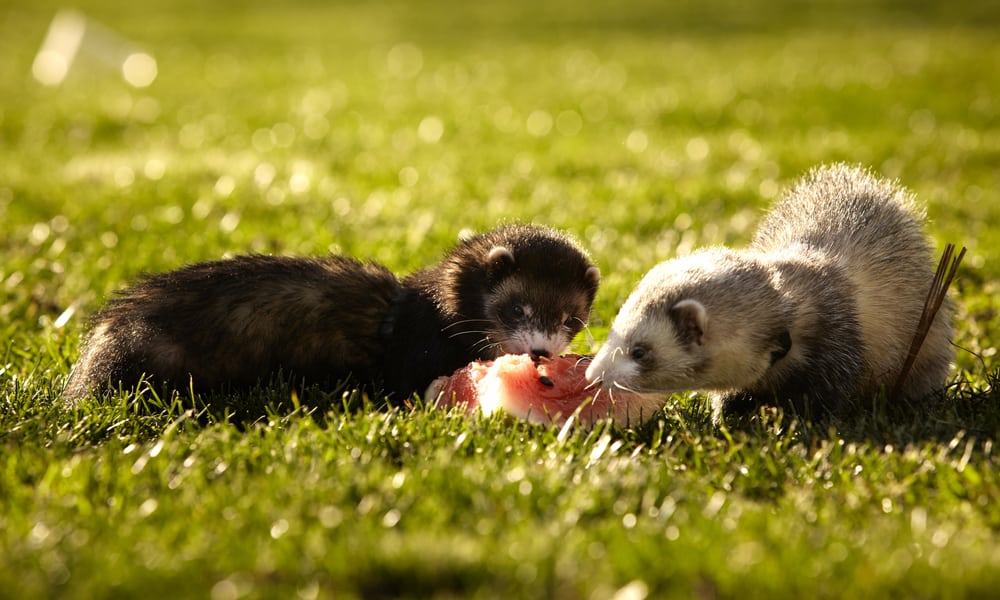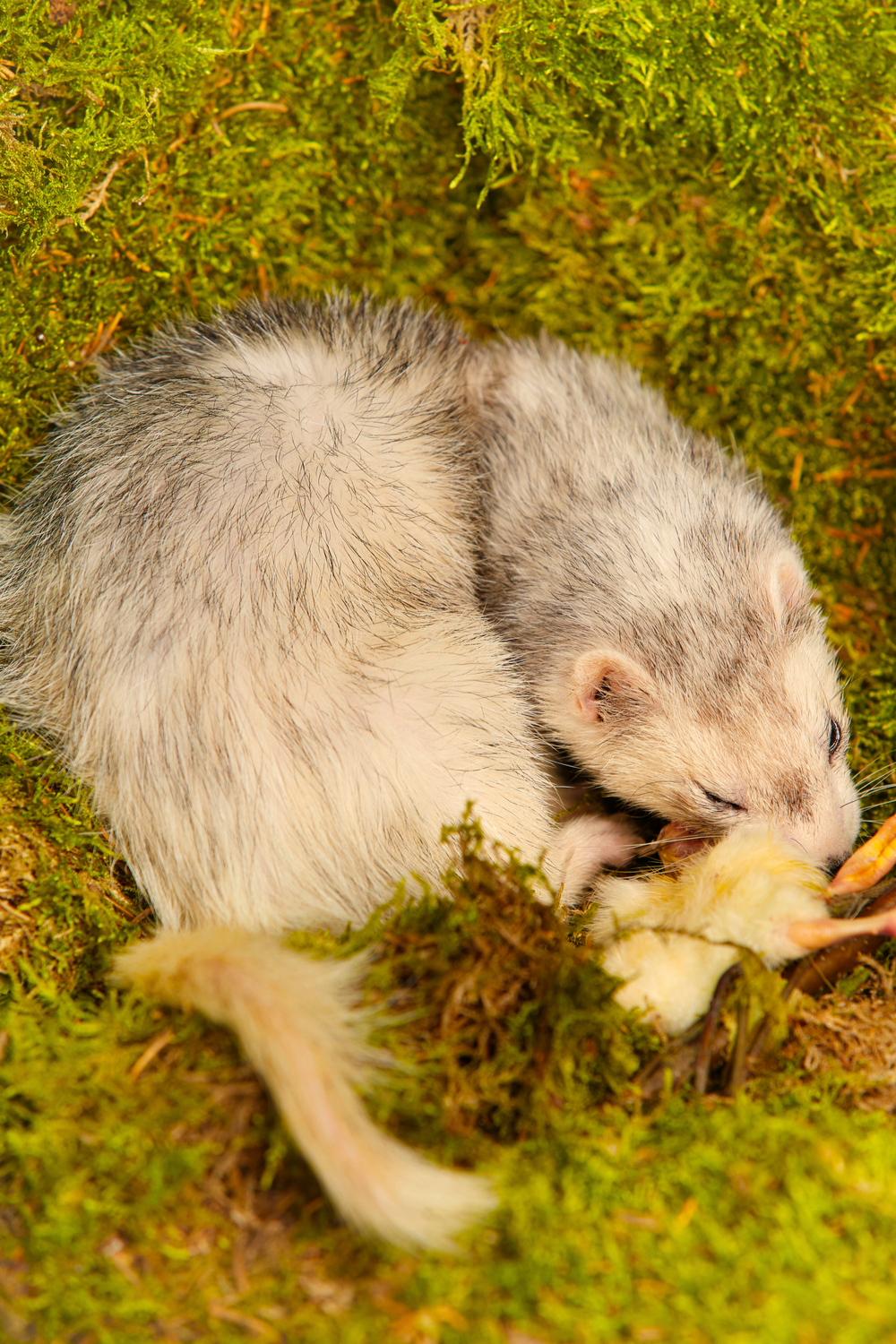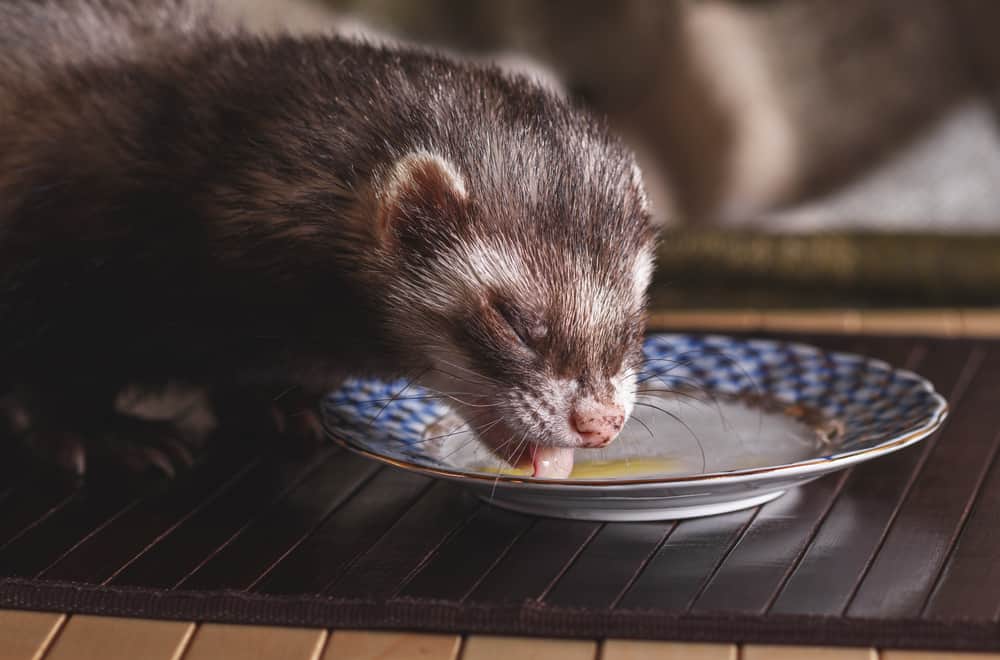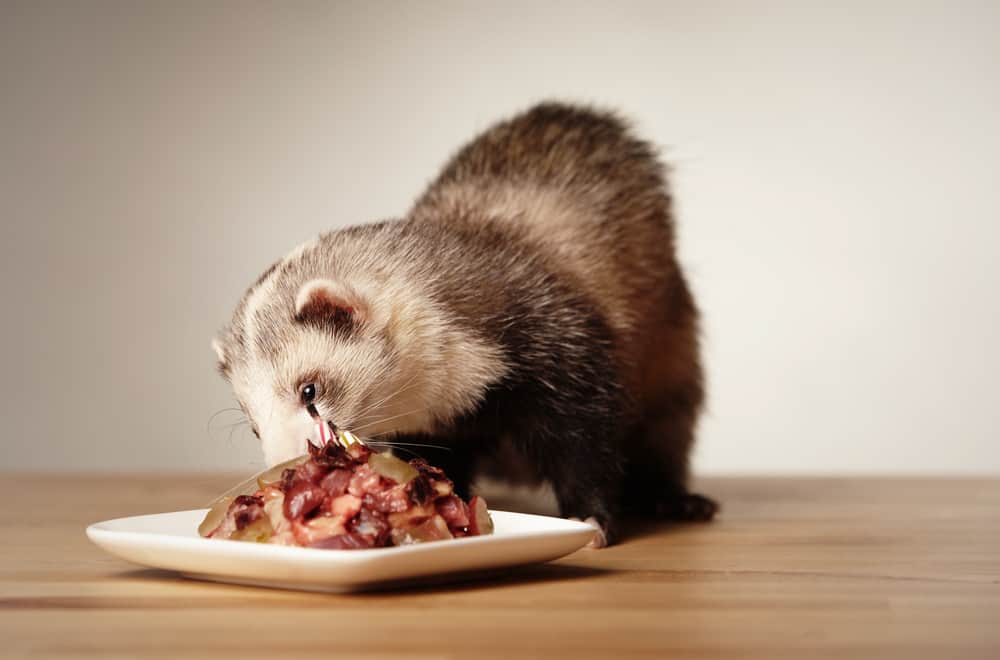If you’re considering keeping a ferret as a pet, you need to know how to take care of him – or her! But what do ferrets eat? Where should they be kept? And do you need to groom them?
We’re going to find the answers to all these questions and more! So read on to find all the information you need to keep your ferret healthy and happy.
Ferret Habits and Biology
Ferrets have a long history as domesticated animals. There’s documented evidence of people keeping ferrets as far back as 63 BCE. And some believe they were kept as pets by the ancient Egyptians.
Unlike their close relatives – weasels, stoats and otters – ferrets will not survive in the wild. That means that if you own ferrets, it’s important to keep them secure.
They are playful creatures, and make great pets if they are handled with care. While they’re independently minded, they also enjoy interacting with humans. And they’re both quiet and intelligent, able to recognise their name and even perform tricks.
Ferrets need stimulation and exercise. That means if you keep them in a cage, they need time outside it every day. They should be let out for at least 4 hours, with a couple of hours of human company as a minimum. This cute YouTube video shows ferrets enjoying playing in the snow.
A “hob” is a male ferret, whilst a female is known as a “jill” and a baby as a “kit”. And if you have a whole group of ferrets, the collective noun is a “business”!
They are comfortable in temperatures of between 50 and 80 degrees Fahrenheit. As fur covered animals, it’s important they don’t get too hot. They shouldn’t be exposed to temperatures higher than 85 degrees.
They’ll need an annual check-up at the vet. This should check for Aleutian Disease Virus, which is a common and potentially fatal condition in ferrets.
Ferrets are also vulnerable to respiratory and flu-like illnesses – and they can catch colds from humans. So if you’re not well, be very careful about handling your ferret.
Ferrets are naturally fastidious creatures, and they will groom themselves regularly. They moult twice a year, and giving them a comb then will help get rid of the loose fur. They also need their claws clipped and their ears checked for mites or wax every couple of weeks.
With good care and good health, ferrets can live to between 6 and 10 years old.
What Do Ferrets Like to Eat Most?
Ferrets are strictly carnivorous, with protein and fat making up the bulk of their diet. Food needs to be fresh and easily digestible.
Ferrets are normally sensible eaters. They burn up energy fast, so they do best eating little and often. They’ll normally eat between eight and ten small meals a day. Leaving food out for them will allow them to snack when they’re hungry – and they’re very unlikely to overdo it.
It’s also important that they always have access to fresh water. That will ensure they stay hydrated and don’t overheat.
A healthy diet for a ferret includes at least 36 percent protein, and around 20 percent fat. Other nutrients, especially carbohydrates, should be consumed only in small quantities.
Here are some foods ferrets love to eat:
- Dried commercial ferret food – commercial ferret foods are specially formulated to give ferrets the nutrients they need. Dried foods are particularly good for adult ferrets, as they promote good dental health.
Some commercial foods are better quality than others, however. Check the ingredients and ensure that sources of animal protein, like chicken or lamb, are listed first.
- Canned commercial ferret food – while dry food is good for ferrets’ teeth, canned food has some advantages too. It is softer for young ferrets and those with existing dental problems. And it can also be a good way to encourage a picky ferret to eat.
- Boiled eggs – half a boiled egg is great as an occasional treat for your ferret. Just don’t offer it too often. Just like people, ferrets can put on weight if they eat too much, and that can lead to health problems. Treats shouldn’t make up more than 10 per cent of your ferret’s diet.
- Chicken, turkey or lamb – either cooked or raw meat is another good option for a treat. Chicken, turkey and lamb are all suitable. They’re packed full of the protein ferrets need to stay healthy. This YouTube video talks through a range of options for feeding ferrets raw meat.
- Kitten food – if you can’t find a specialist ferret food, kitten food can be used as an alternative. It’s higher in protein than standard cat food, which makes it better for ferrets.
If you’re feeding your ferret with kitten food, however, you’ll need to supplement it with fatty acids. You’ll be able to get those from your local pet store.
- Meat-based baby food – chicken or turkey baby food can be used to supplement your ferret’s diet. Just take care to check the ingredients carefully before you make your choice. We’ll tell you more about what you need to avoid in the next section.
Foods Your Ferret Should Avoid
We’ve already seen that ferrets are carnivores. In fact, unlike humans, they’re what’s known as “obligate” carnivores. This means they must have meat in order to live. And they can’t tolerate some other kinds of food.
So what foods should you avoid giving to your ferrets?
- Dairy products – ferrets are unable to digest lactose. That means they should stay away from dairy products like cheese, cream, milk and yogurt.
- Carbohydrates – this is another type of nutrient that ferrets cannot digest properly. That means they shouldn’t eat foods like potatoes, rice or bread. And it also means they won’t be able to digest fruits and vegetables properly.
Check the ingredients of commercial ferret food before you buy it. Some cheaper foods may be bulked up with grains. These are packed with carbohydrates and are therefore difficult for your ferret to digest.
While meat-based baby food, such as that made with chicken and turkey can be okay, check the ingredients. Gravy won’t cause problems, but the vegetables and starches often included in the recipes are a different matter.
- Grapes and raisins – we’ve already seen that the carbohydrate content of fruit and veg isn’t good for ferrets. But some types of fruit, like grapes and raisins, are actually poisonous to them. Steer clear of these at all costs.
- Sugary foods – sugars are a form of carbohydrate, so this is another no-no for ferrets. Chocolate and candy may be okay as an occasional treat for humans. For ferrets, however, they can cause serious problems.
- Cured meats – the high salt content of cured meats means that they aren’t suitable for ferrets. That rules out most kinds of jerky, for example.
Tips to Feed Your Ferret
Ferrets imprint on their food when they are about six months old. In other words, what they are eating then will determine what they enjoy eating for the rest of their lives.
It’s important to bear that in mind when you’re formulating a diet for your ferrets. You’ll want to be able to sustain the same eating habits for a long time.
One of the main debates when it comes to ferrets’ diets is whether they should be fed commercially prepared or raw food. If you’re trying to get ferrets to transition to a raw diet after they’re six months old, it’s a lot of work. This YouTube video from FinleytheFerret explains some of the issues.
Devotees of raw food diets, however, believe that it’s very advantageous to ferret health. They talk particularly about the thick and glossy coats of ferrets fed a raw food diet.
Just note that this isn’t a simple case of feeding your ferrets raw meat. They also need to eat the right mix of bones and organs to ensure they get all the necessary nutrients, vitamins and minerals.
It’s possible to buy raw food mixes that provide these in the right proportions to cut down preparation time. But you will still need to plan your ferrets’ meals for several days at a time. Some meals will need to be based around raw meat. Others will involve meaty bones and/or organs.
There are also specific requirements about what constitutes a raw meaty bone. There has to be enough edible bone and meat – between 10 and 15 percent of the total weight – for it to count.
If that sounds like a lot of hard work – it is! Commercial ferret foods will be a better option if you have limited time (or motivation) for all that prep.
Summary
That brings us to the end of our look at the question of what do ferrets eat! Ferrets are inquisitive, entertaining and affectionate animals. Feeding them the right diet will give them the best possible chance of living a long and healthy life.
Whether you choose a raw food diet or commercial dry ferret food, composition is key. Aim for at least 36 percent protein and around 20 percent fat, and you’ll have a happy, healthy ferret.




Our ferret won’t eat anything, we have tried everything, He is losing weight we’re very worried, He’s a male and we have a female both fixed the female seems fine, We just don’t know what we can do for him.